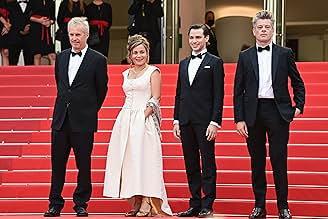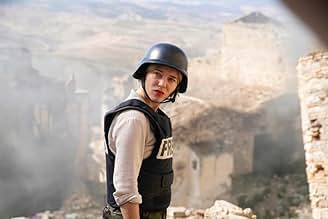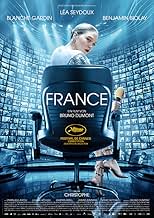CALIFICACIÓN DE IMDb
5.9/10
5.4 k
TU CALIFICACIÓN
Una famosa periodista, que compagina su ajetreada carrera con su vida personal, ve arruinada su vida por un extraño accidente de coche.Una famosa periodista, que compagina su ajetreada carrera con su vida personal, ve arruinada su vida por un extraño accidente de coche.Una famosa periodista, que compagina su ajetreada carrera con su vida personal, ve arruinada su vida por un extraño accidente de coche.
- Premios
- 6 nominaciones en total
Alfred de Montesquiou
- Alex
- (as Alfred Demontesquiou)
Opiniones destacadas
Léa Seydoux gives an admirable performance, demonstrating the range we know she's capable of and has shown elsewhere. No matter what a scene requires of her, she carries it with great ease, and I don't think there's much arguing that her acting here represents the chief value of 'France.' Beyond this, filmmaker Bruno Dumont illustrates keen direction in orchestrating shots and scenes, and I also appreciate David Chambille's cinematography. I also like Christophe's original music, compositions that are fetching in and of themselves, and which are shrewd and witty in how they're employed here. All this is to say nothing of outstanding filming locations, superb production design, lovely costume design, hair, and makeup, and a fine supporting cast. In the proverbial nuts and bolts of the movie, this is really very well done.
It's Dumont's screenplay that I'm struggling with. There's a bounty of strong ideas all throughout the picture, a variety of notions that could have easily been more discretely focused upon to grand success. At various points we're treated to the meaningless word salad of talking heads on television; the absurdity of celebrity, and the pressures of fame; the ego-fluffing and idol worship that might consume personal assistants; the extremely wry, dry inanity of the calculated construction of news reports and programs; the dehumanization of public figures, in that they are not expected or possibly not allowed to show earnest human emotion; the short attention span and fickle favor of public consciousness; the abject horrors of capitalism, and the profoundly upside-down savior complex that the rich and powerful may have; the human frailties and personal problems that even the most publicly visible or celebrated people might bear; and more. Personally I'm inclined to think the latter thread is the best one 'France' can claim, but they're all worthy in their own right. The problem is that the title tries to do it all. In varying measures, and at different times, Dumont touches upon all these notions, and attempts to mix them all together. In theory I suppose the screenplay could have found success, but in practice, here, I think the execution is wildly uneven and imbalanced: I don't think any of the suggested facets receive all due treatment, the storytelling subsequently comes off as scattered, and the swirl of comedy and drama that is intended instead feels like difficulty in finding the right tone, or in figuring out exactly what 'France' should have or needed to be.
As if to emphasize the point, when a significant story beat arrives at around the seventy-five minute mark with character Charles, it truly seems like Dumont couldn't make up his mind as to whether it should have been romantic, underhandedly funny, or heavily dramatic. He tries to make it be all three of these things, but instead it feels like nothing at all. The same goes for shots that isolate the protagonist and zoom in on her, which could be used for dramatic effect or to cheeky, satirical ends; here, they just feel empty. Even more serious story beats to follow outright flounder with the weak treatment they're given. For all the skill Seydoux possesses, and exhibits here, the mishmash of a framework she has to work with means that some of the acting extracted from her in this instance rings hollow in a manner beyond the scope of what the feature cannot achieve and project with any more than partial success. Moreover, as if the many ideas in the writing weren't already treated unevenly, they're presented in a fashion that increasingly feels altogether haphazard, or possibly unfinished before filming commenced. Given that some of the ideas here broach very serious subject matter of one type or another, and that some other moments are plainly frivolous - well, I'll be honest, this happens to be the first of Dumont's works that I've seen. Were I to judge him based purely on this, I can't say I'd be inclined to explore anything else he's made.
Once more: in many regards this is well made, and in the very least, Seydoux is definitely the shining star of 'France.' Among the qualities it can boast, I simply don't think Dumont's screenplay is one of them. There was boundless potential, and so many good thoughts, but far, far too little of it was arranged in a shape that lets any of it take hold, or count for much of anything. I think what really needed to happen here was for Dumont to have at least one other pair of eyes corroborate on the writing, at least for the sake of tightening the whole, trimming excess, and finding a more cohesive, centered path forward for the story. I don't dislike this picture; I don't think it's any more than half the picture it could have been. When all is said and done it's hard for me to particularly recommend this, even for those who are huge fans of Seydoux or someone else involved. I won't recommend against it, but there are many, many other titles one could be watching instead, and many that approach all the included concepts more thoughtfully. There are worse ways to spend 130 minutes than watching 'France,' yet the problem is that with the finished product being such as it is, there are also certainly far better ways to spend one's time, too, and ultimately I wonder if I'm not being too generous in my assessment.
It's Dumont's screenplay that I'm struggling with. There's a bounty of strong ideas all throughout the picture, a variety of notions that could have easily been more discretely focused upon to grand success. At various points we're treated to the meaningless word salad of talking heads on television; the absurdity of celebrity, and the pressures of fame; the ego-fluffing and idol worship that might consume personal assistants; the extremely wry, dry inanity of the calculated construction of news reports and programs; the dehumanization of public figures, in that they are not expected or possibly not allowed to show earnest human emotion; the short attention span and fickle favor of public consciousness; the abject horrors of capitalism, and the profoundly upside-down savior complex that the rich and powerful may have; the human frailties and personal problems that even the most publicly visible or celebrated people might bear; and more. Personally I'm inclined to think the latter thread is the best one 'France' can claim, but they're all worthy in their own right. The problem is that the title tries to do it all. In varying measures, and at different times, Dumont touches upon all these notions, and attempts to mix them all together. In theory I suppose the screenplay could have found success, but in practice, here, I think the execution is wildly uneven and imbalanced: I don't think any of the suggested facets receive all due treatment, the storytelling subsequently comes off as scattered, and the swirl of comedy and drama that is intended instead feels like difficulty in finding the right tone, or in figuring out exactly what 'France' should have or needed to be.
As if to emphasize the point, when a significant story beat arrives at around the seventy-five minute mark with character Charles, it truly seems like Dumont couldn't make up his mind as to whether it should have been romantic, underhandedly funny, or heavily dramatic. He tries to make it be all three of these things, but instead it feels like nothing at all. The same goes for shots that isolate the protagonist and zoom in on her, which could be used for dramatic effect or to cheeky, satirical ends; here, they just feel empty. Even more serious story beats to follow outright flounder with the weak treatment they're given. For all the skill Seydoux possesses, and exhibits here, the mishmash of a framework she has to work with means that some of the acting extracted from her in this instance rings hollow in a manner beyond the scope of what the feature cannot achieve and project with any more than partial success. Moreover, as if the many ideas in the writing weren't already treated unevenly, they're presented in a fashion that increasingly feels altogether haphazard, or possibly unfinished before filming commenced. Given that some of the ideas here broach very serious subject matter of one type or another, and that some other moments are plainly frivolous - well, I'll be honest, this happens to be the first of Dumont's works that I've seen. Were I to judge him based purely on this, I can't say I'd be inclined to explore anything else he's made.
Once more: in many regards this is well made, and in the very least, Seydoux is definitely the shining star of 'France.' Among the qualities it can boast, I simply don't think Dumont's screenplay is one of them. There was boundless potential, and so many good thoughts, but far, far too little of it was arranged in a shape that lets any of it take hold, or count for much of anything. I think what really needed to happen here was for Dumont to have at least one other pair of eyes corroborate on the writing, at least for the sake of tightening the whole, trimming excess, and finding a more cohesive, centered path forward for the story. I don't dislike this picture; I don't think it's any more than half the picture it could have been. When all is said and done it's hard for me to particularly recommend this, even for those who are huge fans of Seydoux or someone else involved. I won't recommend against it, but there are many, many other titles one could be watching instead, and many that approach all the included concepts more thoughtfully. There are worse ways to spend 130 minutes than watching 'France,' yet the problem is that with the finished product being such as it is, there are also certainly far better ways to spend one's time, too, and ultimately I wonder if I'm not being too generous in my assessment.
Promising premise, terrible execution. It feels like there was never a script, just some nice locations where someone said "Hey! This would look good! Let's shoot here! We'll figure out where it fits later. Or not."
Unlike its trailer/loglines, this film widely misses the mark as a skewering of image-centered "journalists", infotainment and the like, areas so ripe for the satire which is so badly needed in today's media-centric world. What a missed opportunity!
Fortunately the actor Blanche Gardin can improv or at least deliver some lines well; otherwise.... Also, did they fire the editor? Loooooooooong shots that were really, really unnecessary, contributing nothing but boredom. In fact, it starts to be risible. The relentless pathway eventually seems so ludicrous, one can only start laughing at the incongruities.
I suggest watching with a shot of spirits; every time France cries, take a shot. You'll be drunk in about 10 minutes-- which is not even a good excuse for watching this -- and comatose by the end. And you'll be missing nothing. Shame because Lea Seydoux has been rather good in many good films; who knows what happened here: bad choice? Coercion?
Recap: No script or at least nothing to say, bad editing, scenes that are long and drawn-out for no reason, and even a couple of actors who have all the personaity and intrigue of a plastic spoon (i'll name no names). Make it a definite miss; catch The French Dispatch (or indeed, anything else) instead.
Unlike its trailer/loglines, this film widely misses the mark as a skewering of image-centered "journalists", infotainment and the like, areas so ripe for the satire which is so badly needed in today's media-centric world. What a missed opportunity!
Fortunately the actor Blanche Gardin can improv or at least deliver some lines well; otherwise.... Also, did they fire the editor? Loooooooooong shots that were really, really unnecessary, contributing nothing but boredom. In fact, it starts to be risible. The relentless pathway eventually seems so ludicrous, one can only start laughing at the incongruities.
I suggest watching with a shot of spirits; every time France cries, take a shot. You'll be drunk in about 10 minutes-- which is not even a good excuse for watching this -- and comatose by the end. And you'll be missing nothing. Shame because Lea Seydoux has been rather good in many good films; who knows what happened here: bad choice? Coercion?
Recap: No script or at least nothing to say, bad editing, scenes that are long and drawn-out for no reason, and even a couple of actors who have all the personaity and intrigue of a plastic spoon (i'll name no names). Make it a definite miss; catch The French Dispatch (or indeed, anything else) instead.
No plot, attempts at a storyline. Completely all over the place. What a waste of hours! Neither the main plot nor the plot adds up to anything. Love affair seems cringy. Husband-wife and even the filial relationship seems so fake. One story moves onto another with no relation in between as if this were the attempt of a photographer to bring together a scrapbook of images. And to be honest, even the images are not that great. So, don't waste your time.
You get the idea what they wanted to do here. To put all different aspects of television (news, reality TV, etc.) in a movie and make a bit fun of it.
But it's just too long and everything keeps on repeating itself. If this movie would be one hour shorter, it would be much better in my opinion.
Also: Lea Seydoux cries more in this movie than me at home chopping onions!
But it's just too long and everything keeps on repeating itself. If this movie would be one hour shorter, it would be much better in my opinion.
Also: Lea Seydoux cries more in this movie than me at home chopping onions!
Bruno Dumont tells the story of a television journalist and presenter. To show us what goes on behind the scenes, the way these journalists operate, their lack of humanity, the staging, their selfishness despite the showcase they present. But also the character of Léa Seydoux, who carries the film, whom Bruno Dumont paints with her contradictions, her complexities, her changing moods. This makes the character almost endearing, not at all monolithic, which we as viewers can't judge, given the number of contradictions in her character.
The mix of professional and amateur actors works perfectly, providing a real anchor that gives density to the subject.
We can only admit that the strings are thick: the film is devoid of subtlety. This is always the case with Bruno Dumont. But the trick with the laptop resting on the joystick that plays the commentary is really a screenwriter's trick, not believable for a second. This penalizes the film as a whole.
It's worth noting that all Léa Seydoux's scenes with her husband, Benjamin Biolay, are the best in the film, whether as a couple or in a group with other people.
All in all, Bruno Dumont gets his messages and criticisms across well, while inviting reflection in which not everything is black and white.
The mix of professional and amateur actors works perfectly, providing a real anchor that gives density to the subject.
We can only admit that the strings are thick: the film is devoid of subtlety. This is always the case with Bruno Dumont. But the trick with the laptop resting on the joystick that plays the commentary is really a screenwriter's trick, not believable for a second. This penalizes the film as a whole.
It's worth noting that all Léa Seydoux's scenes with her husband, Benjamin Biolay, are the best in the film, whether as a couple or in a group with other people.
All in all, Bruno Dumont gets his messages and criticisms across well, while inviting reflection in which not everything is black and white.
¿Sabías que…?
- TriviaThe crew was given permission to shoot in the Élysée palace, in the entrance court and one of the salons. Even though Emmanuel Macron, the President of the French Republic at the time, appears in the opening sequence, it's only through the use of archive footage and clever editing.
- Citas
Voisin tartine: You won't run out of money, we're so rich. To die well, one must die poor. Once you're dead, your kindness will remain.
- ConexionesFeatured in Conversations avec... (2018)
Selecciones populares
Inicia sesión para calificar y agrega a la lista de videos para obtener recomendaciones personalizadas
- How long is France?Con tecnología de Alexa
Detalles
- Fecha de lanzamiento
- Países de origen
- Sitios oficiales
- Idiomas
- También se conoce como
- On a Half Clear Morning
- Locaciones de filmación
- Schloss Elmau, Krün, Bavaria, Alemania(wellness resort in the mountains)
- Productoras
- Ver más créditos de la compañía en IMDbPro
Taquilla
- Presupuesto
- EUR 5,668,000 (estimado)
- Total en EE. UU. y Canadá
- USD 49,347
- Fin de semana de estreno en EE. UU. y Canadá
- USD 5,811
- 12 dic 2021
- Total a nivel mundial
- USD 1,348,498
- Tiempo de ejecución
- 2h 13min(133 min)
- Color
- Relación de aspecto
- 1.85 : 1
Contribuir a esta página
Sugiere una edición o agrega el contenido que falta

![Ver Bande-annonce [OV]](https://m.media-amazon.com/images/M/MV5BYzExYzA2ZjktOWI1MS00ZWUwLWE5ZTctYzU4ZGE3NTA4M2VjXkEyXkFqcGdeQXRyYW5zY29kZS13b3JrZmxvdw@@._V1_QL75_UX500_CR0)












